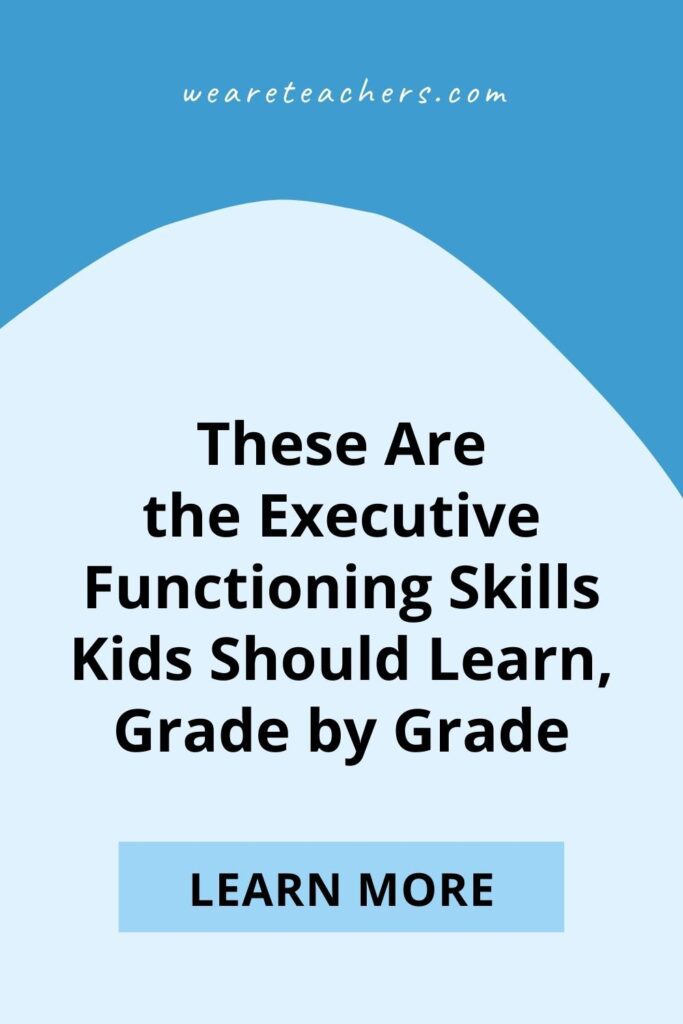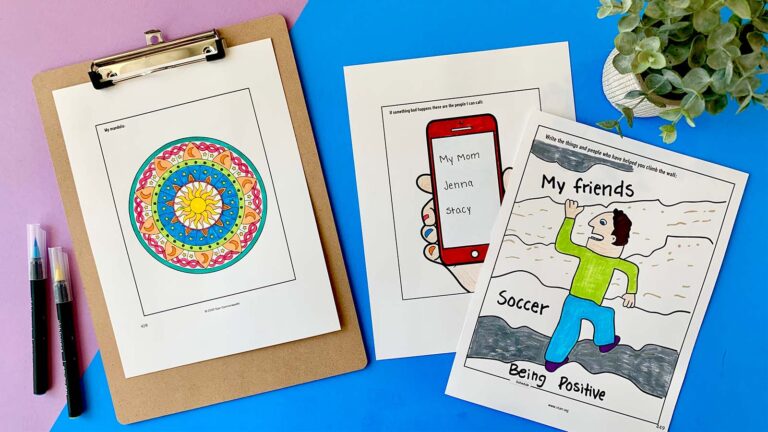“Executive function” is one of those phrases that gets thrown around a lot in child development, but it can be a little confusing. Read on to find out exactly what it means, and discover the executive functioning skills you can expect from kids at different age levels.
What is executive function?
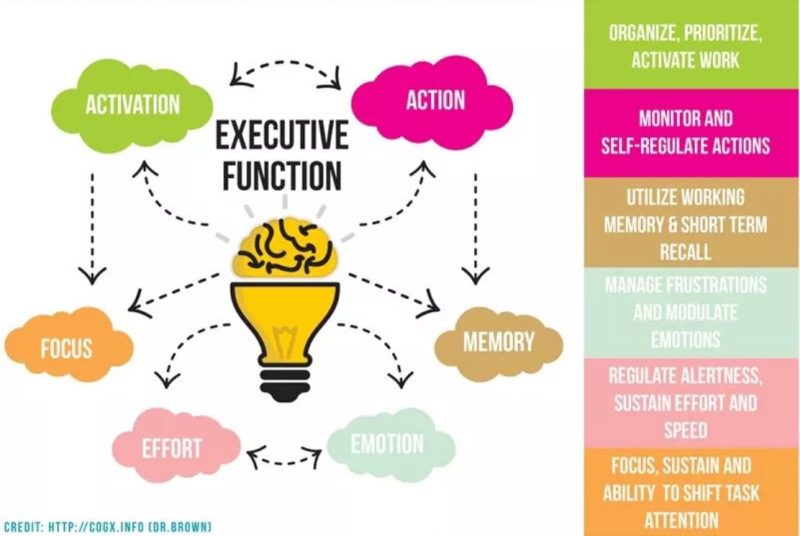
Source: Hope for HH
Executive functions are the mental skills we use to live our lives every single day. They help us plan, prioritize, react appropriately, and handle our emotions. Basically, it’s the management system our brain uses to help us function in various situations. Young children have fewer executive function skills—they develop them as they grow. Sometimes they learn them naturally simply by watching others. In other cases, they’re things that need to be taught more directly.
For many people, executive functions develop a bit at a time throughout the childhood and teen years, and even into the 20s. Others, though, may always struggle with executive function. Those with ADHD (attention-deficit/hyperactivity disorder) lack the executive function skills appropriate for their age group, and find it challenging to develop those skills no matter how hard they try. Other behavioral disorders are also caused by difficulty with executive function.
Executive functions can be broken into three main categories:
Working Memory
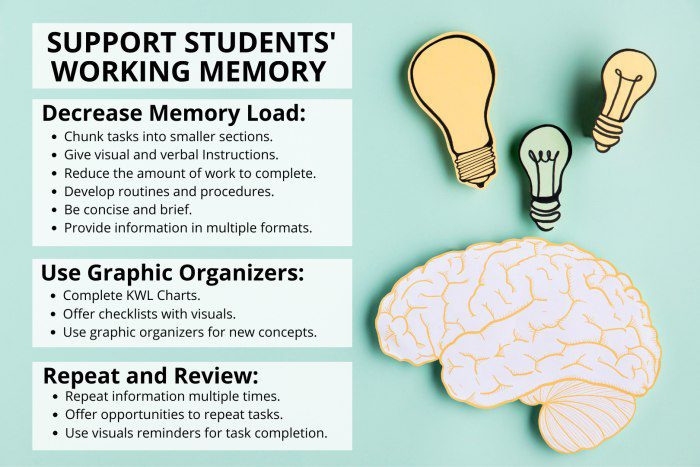
Source: TCEA
Our memory comes in two basic types: short-term and long-term. Long-term memories are things our brain holds onto for years or even our entire lives. Long-term memory enables us to picture our childhood bedroom or remember the lyrics to our favorite songs. Short-term memories are things we recall for a few moments or days but aren’t stored forever.
If you think of memories like food, short-term memories are things that you store in the fridge for a short while. Long-term memories, on the other hand, are the dry goods or preserved produce that can stay on the shelf in the pantry for years.
Example: Jorge’s mom asks him to pick up milk, peanut butter, and oranges at the store on his way home from practice. His working memory remembers those items long enough to help him know what to get at the store, but he probably won’t remember those items a week later.
Cognitive Flexibility
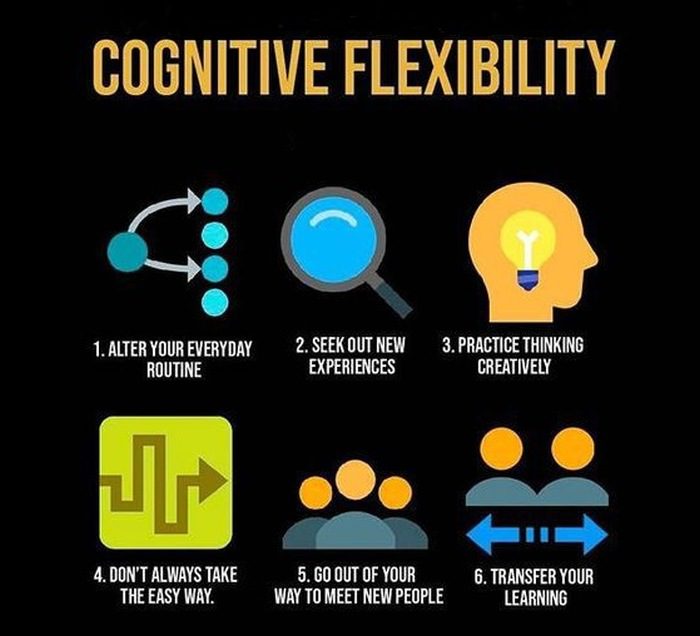
Source: Institute for Career Studies
Also called flexible thinking or cognitive shifting, this is the ability to change our thinking as circumstances change. It helps us adjust when something unexpected happens, big or small. Cognitive flexibility is important for multitasking, problem-solving, and understanding other points of view.
Example: Kris is making chocolate chip cookies for the school bake sale tomorrow, but realizes at the last minute they don’t have any chocolate chips. Instead, Kris flips through the recipe book and finds another option that they have all the ingredients on hand for, and decides to make those instead.
Inhibitory Control
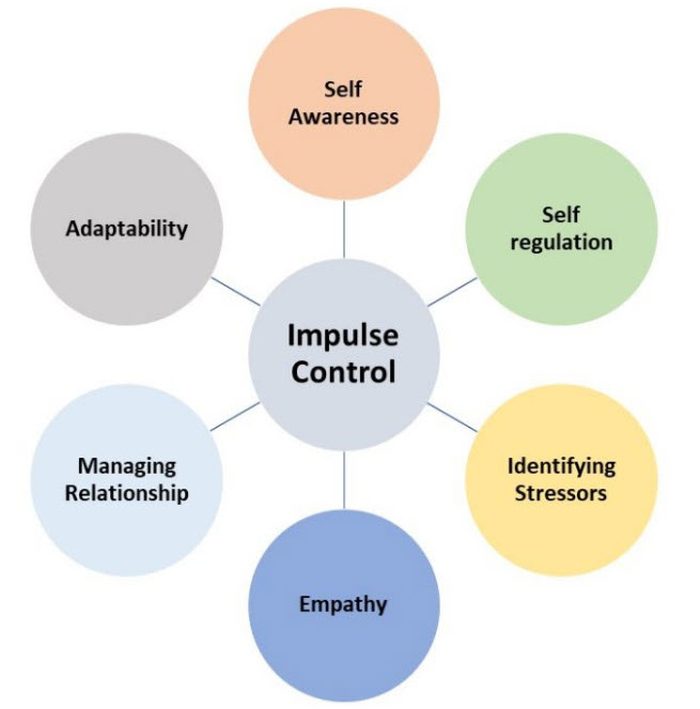
Source: shrikantmambike
Inhibition (also called impulse control and self-control) stops us from doing things impulsively. When you display inhibitory control, you’re using reason to choose the appropriate response to a situation. We all struggle with this sometimes, like when a situation makes us angry and causes us to yell or curse without thinking. Learning to slow down our reaction time and consider others’ feelings are key to inhibitory control.
Example: Eight-year-old Kai and 3-year-old Mira were looking forward to going to the amusement park with their uncle this weekend, but he called Saturday morning to say he couldn’t make it because he’s sick. Kai is sad but hopes her uncle will feel better soon. Mira is also disappointed and shows it by immediately launching into a temper tantrum that goes on for an hour, showing a lack of inhibitory control.
Executive Functioning Skills for Elementary Students
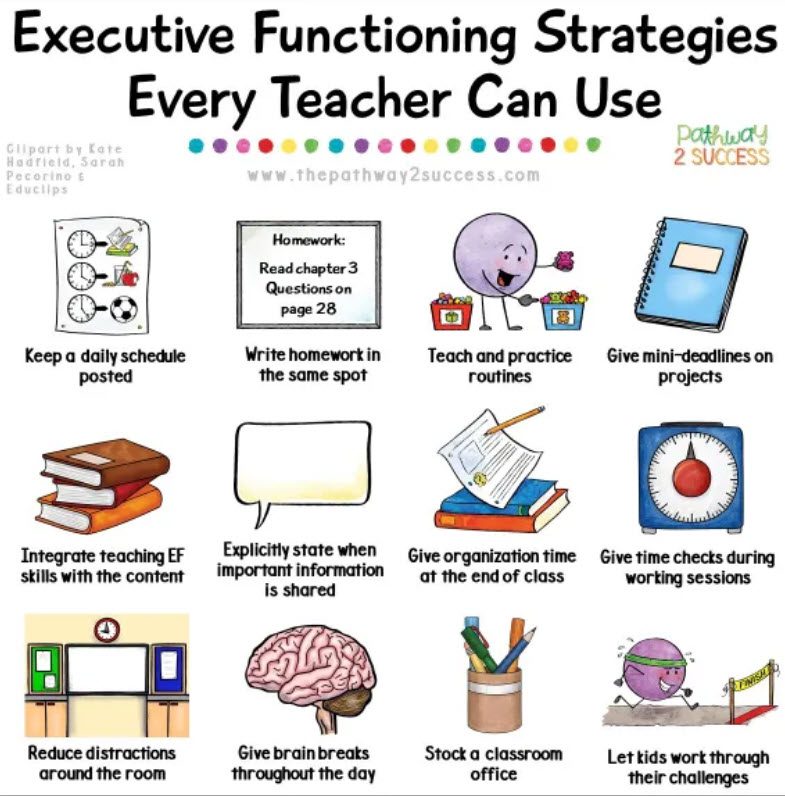
Source: Pathway 2 Success
At this age, kids are just starting to develop foundational skills. Some may lag behind others, and that’s OK. Direct instruction on some skills will be helpful for all students, and modeling good behavior is vital. Here are some reasonable expectations for K-5 students.
Planning, Time Management, and Organization
- Follow a set of simple steps to meet a goal.
- Play games that require strategy and the ability to think ahead.
- Begin to be able to estimate how long tasks or activities will take, and use that knowledge to plan ahead.
- Start to manage their time to fit in both required tasks and activities they want to do.
- Begin and complete tasks on their own that take 30 to 60 minutes.
- Sequence stories and events in the proper order.
- Gather materials needed for routine events, like putting together their lunch or backpack for school (may need adult reminders and assistance).
Problem-Solving, Flexibility, and Working Memory
- Begin to understand the need to break problems down, then brainstorm to identify solutions.
- Work independently to play age-appropriate games and put together puzzles.
- Play team sports or participate in clubs and other group activities, getting along with others who behave differently (often with help from adults).
- Recall previous information and experiences to apply to new circumstances (e.g., knowing that even though the numbers change, the steps to solve a math problem remain the same).
Self-Control (Impulse and Emotional)
- Develop the ability to control tantrums and disappointments without needing comfort from adults.
- Recognize negative consequences of impulsive behavior.
- Follow safety and other general rules, even when adults are not around.
- Comply with most accepted social norms (listening when others talk, making eye contact, using appropriate voice levels, etc.).
- Take useful notes while learning.
- Set goals and make plans to achieve them (with some adult assistance).
- Save money for something they really want.
- Check their own work for mistakes.
- Reflect on their own behavior through journaling, discussion, or other methods.
Executive Functioning Skills for Middle and High School Students
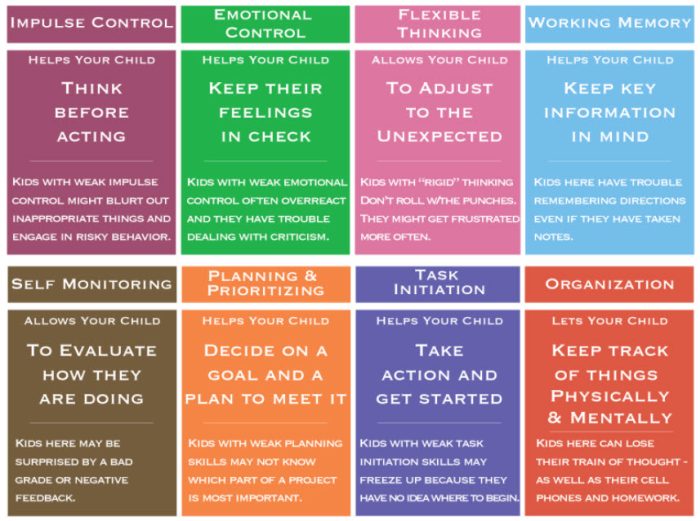
Source: The Whilde Method
By this time, tweens and teens have made great strides with many or most of the skills listed above. They continue to develop these skills as they get older, with the ability to handle more complex tasks and more difficult problems. Bear in mind that executive functioning skills continue to develop well into our 20s, so even seniors in high school or college students may not have mastered all the skills listed here.
Planning, Time Management, and Organization
- Understand the importance of time management and use it effectively.
- Independently plan the schedule or steps needed to accomplish homework or a school project.
- Plan social events and activities with their peers.
- Follow complex school and home routine schedules with minimal or no reminders from adults.
- Begin and complete tasks on their own that take 60 to 90 minutes or longer.
Problem-Solving, Flexibility, and Working Memory
- Identify problems at home, school, or socially, and recognize the need to find a solution.
- Sort out conflicts independently (may seek adult advice on complex problems).
- Adjust schedules as needed when new commitments and responsibilities arise.
- Independently play sports or participate in group activities, getting along with many other types of people.
- Adapt to minor or major unexpected changes, and learn when to seek help.
- Begin developing the ability to multitask effectively and switch between tasks as needed.
Self-Control (Impulse and Emotional)
- Read other people’s emotions and respond appropriately (may seek adult guidance).
- Develop greater empathy for others and desire social change.
- Find effective strategies to curb impulsive behavior.
- Learn to manage finances and create a budget.
- Monitor own behavior: Recognize success, and make plans for improvement.
- Seek feedback from trusted peers and adults like coaches or teachers.
- Understand the need to regulate emotions and seek tools for doing so.
Ways To Teach Executive Function
Looking for ideas on how to help your students master these key skills? Try some of these resources.
- 5 One-Minute Activities To Help Your Students Build Emotional Resilience
- 18 Zones of Regulation Activities To Help Kids Manage Their Emotions
- 7 Ways To Use Printable Emoji Cards To Build SEL Skills
- Free Cards: 50 SEL Prompts for Middle and High School Students
- Tried-and-True Teacher Secrets To Stop Students From Blurting Out
- How To Create and Use a Calm-Down Corner in Any Learning Environment
- Teach Students About Healthy Friendships in Preparation for Middle School
- The Most Common Friendship Issues in the Classroom
- Help! Where Have These Kids’ Social Skills Gone?
- Activities That Teach Students Real-World Money Skills
How do you teach executive functioning skills in your classroom? Come share your ideas and ask for advice in the WeAreTeachers HELPLINE group on Facebook.
Plus, check out 11 Classroom Management Techniques That Really Work.
